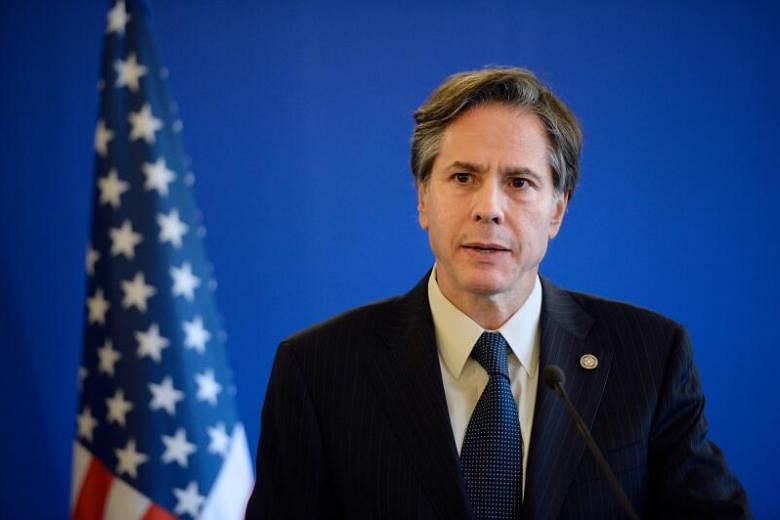WASHINGTON - Veteran diplomat Antony Blinken, 58, has been named the United States' next Secretary of State.
The official announcement by President-elect Joe Biden, expected on Tuesday, came earlier on Monday. Mr Jake Sullivan, 43, was named National Security Adviser; and Ms Linda Thomas-Greenfield, 68, was named Ambassador to the United Nations.
Former Secretary of State John Kerry is back and will fight climate change full-time as Special Presidential Envoy for Climate. He will also sit on the National Security Council.
Avril Haines, a former Deputy Director of the CIA and Deputy National Security Advisor, will serve as Director of National Intelligence - the first woman to lead the intelligence community.
Alejandro Mayorkas, a former Deputy Secretary of the Department of Homeland Security (DHS), will be the first Latino and immigrant nominated to serve as Secretary of the DHS.
Mr Sullivan, with degrees from Yale Law School and Oxford University, was in the Obama administration as national security adviser to Mr Biden. Previously among other roles, he was deputy chief of staff to Mrs Hillary Clinton when she was secretary of state, and senior policy adviser and chief counsel to Senator Amy Klobuchar in his home state, Minnesota.
Ms Thomas-Greenfield, an Africa specialist, is a former assistant secretary for the Bureau of African Affairs.
The choices, widely expected, signal a return to professionalism and experience, analysts said.
Mr Blinken is positioned to be a strong Secretary of State, tweeted Mr Richard Haass, president of the Council on Foreign Relations.
He would have "a relationship with his boss that allows him to speak truth to power and the authority to speak for his boss. And he brings knowledge of the issues and State Department to the job."
Mr Blinken, who grew up in New York and Paris - he speaks French, played the guitar and once recorded two songs - is known for his belief in the US' alliances, which are seen as Washington's unique advantage, first against the old Soviet Union and now against a more aggressive China.
Once former president Bill Clinton's chief foreign policy speech writer, Mr Blinken went on to be deputy national security adviser and deputy secretary of state in the Obama administration.
He joined Mr Biden's staff when the latter was vice-president, but his association with the President-elect stretches further back.
He was staff director for then Senator Biden when he was chairman of the Senate Foreign Relations Committee.
He is seen to be a centrist but has also supported intervention - for example in Libya and Syria. However, he also helped engineer the US exit from Iraq.
"We would not have got out of Iraq in a way that left the government with a fighting chance to make it without Tony Blinken's hard work," Mr Biden told The Washington Post in 2013. "He was the go-to guy. He still is the go-to guy."
When out of government, Mr Blinken co-founded political strategy firm WestExec Advisers, along with Ms Michele Flournoy, another Obama-era figure who is believed to be in contention for Defence Secretary.
At an Axios digital event last month, Mr Blinken said: "I think you'd see the Biden administration acting on the one hand with some humility, because most of the world's problems are not about us, even though they affect us.
"We can't just flip a switch and solve them. But also, with confidence, because America, at its best, still has a greater capacity than any country on earth to mobilise others in positive, collective action.
"A Biden administration would actually reassert American leadership, leading with our diplomacy."
A former State Department official who worked with Mr Blinken, speaking to The Straits Times on condition of anonymity, said: "He is a steadfast champion of a liberal international order, very focused on the power of institutions, rules and alliances.
"He is also someone who understands the State Department and the role of career diplomats and civil servants. He was adept at leading, at setting an agenda, at harnessing the power of bureaucrats."
This world view syncs well with that of Mr Sullivan, which signals a cohesive foreign policy team.
In a lengthy article for The Atlantic in January last year, Mr Sullivan wrote that President Donald Trump had "surfaced questions that need clear answers".
"Those of us who believe that the United States can and should continue to occupy a global leadership role, even if a different role than in the past, have to explain why Trump is wrong - and provide a better strategy for the future," he noted.
"An energised, inspiring, and ultimately successful foreign policy must cut through Trump's false, dog-whistling choice between globalism and nationalism. It must combine the best kind of patriotism… and the best kind of internationalism.
"And it should reject the worst kind of nationalism (damn-the-consequences aggression and identity-based hate-mongering) and the worst kind of internationalism (the self-congratulatory insulation of the Davos elite)."
Mr Sullivan ended his piece with a recollection of a meeting with the late Singapore founding prime minister Lee Kuan Yew, when the latter apparently told him and then Vice-President Biden how much he admired America's buried "black box" that contained the secret of America's ability to constantly reinvent itself.
"We need to find and unlock that black box," Mr Sullivan wrote.


